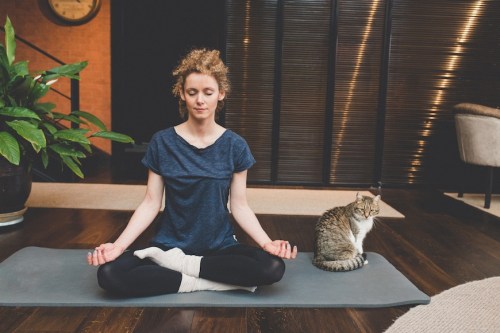If meditating is stoking rather than extinguishing your anxiety, here’s how to tweak your practice
When meditation for anxiety not only doesn't work but also makes things worse, there are some ways to tweak your practice. Here's what experts say.

I’ve always been a pretty anxious person, but last fall, my anxiety level rose from a manageable 5 to an all-consuming 10. After a few weeks of bad sleep, a poor appetite, and nonstop circular thoughts, I turned to the tool many mental-health experts swear by: meditation.
The problem? Not only did my meditation practice not help, but it actually made things worse. I practice mindfulness meditation, and something about being tuned in to my breath made me even more aware of my anxious thoughts. Perhaps least bearable was the fact that my practice actually highlighted some of the physical anxiety symptoms I was experiencing, like a racing heart and a clenched, too-tight stomach.
Upon googling the phenomenon, a number of message boards made clear that I’m in good company. While I found a bit of solace in having my struggle shared by others, that still didn’t arm me with strategies to quell my anxiety. So to learn more about why this happens—and what to do about it—I turned to experts.
Why does meditation sometimes stoke rather than extinguish anxiety?
According to holistic psychotherapist Alison Stone, LCSW, turning attention inward, as meditation asks us to do, can put other parts of us on high alert. “We might get an immediate feeling of ‘I’m doing this wrong’, or ‘this feels unnatural’, which might elicit a spiral of anxiety-related thoughts.” This heightened self-awareness of emotions can cause discomfort, especially in the beginning of a meditation journey. “Most of the time, we’re used to avoiding our feelings through distractions (think TV, social media, food), so forcing ourselves to get in touch with our internal world can initially feel disorienting.” Stone says.
“Mindfulness and body-scanning practices ask that you tune in to how you are feeling and to simply notice what is happening. It is possible that tuning in to your feelings like this can amplify the anxiety around them.” —Claire Grieve, yoga specialist and meditation expert
Furthermore, calling attention to the exact feelings that make us uncomfortable can exacerbate the issue by emphasizing those emotions, says Claire Grieve, a yoga specialist and meditation expert. “Mindfulness and body-scanning practices ask that you tune in to how you are feeling and to simply notice what is happening,” she says. “It is possible that tuning in to your feelings like this can amplify the anxiety around them.”
How to tweak your meditation ritual to be more helpful
Of course, there’s no reason to ditch your meditation practice altogether when you’re feeling extra anxious. Simply implement a few key adjustments to help your ritual work well for you. Stone’s recommendation? If a certain meditation doesn’t soothe your anxiety, find the thing that does.
“For some, that might mean taking a few deep breaths (exhaling for longer than you inhale) or focusing on grounding the body: Can you feel your feet on the floor? Can you wiggle your toes? How about squeezing and relaxing your fists?”
“Bring your awareness to whatever’s in the room you are in. How many blue items can you find? Now how many yellow items? Counting activates the left side of your brain, which is responsible for logic and rational thinking. This often provides some relief from acute anxiety.” —psychotherapist Alison Stone, LCSW
But for some people, the ritual shift needs to be more external. “Try changing your environment by going for a quick walk,” she suggests. “If that’s not possible, bring your awareness to whatever’s in the room you are in. How many blue items can you find? Now how many yellow items? Counting activates the left side of your brain, which is responsible for logic and rational thinking. This often provides some relief from acute anxiety.”
Pedram Shojai, a doctor of oriental medicine known as the Urban Monk, says when you’re meditating with the hope of alleviating anxiety, one of the best things you can do is lean into your intention. “Acknowledge how you feel and breathe into it,” he says. “Say to yourself, ‘I’m feeling anxious, I’m feeling scared, I’m feeling angry…’ all of these are perfectly normal states of being and are part of the human experience.”
Once you honor how you feel, Shojai suggests focusing on your breathing, and reminding yourself that all things pass. “‘Anica, anica, anica,’ or ‘change, change, change.’ That’s the motto of vipassana meditation, which is a great technique for people with anxiety.”
And according to Grieve, the best way to use meditation as a tool for alleviating long-term anxiety is to be consistent. “Even if you are just sitting for five minutes a day, the consistent practice is where you will start to see results.”
Here’s how to create a meditation space in your home that you’ll actually use. And, anxiety aside, here’s how a mediation practice may impact your sex life.
Sign Up for Our Daily Newsletter
Get all the latest in wellness, trends, food, fitness, beauty, and more delivered right to your inbox.
Got it, you've been added to our email list.










